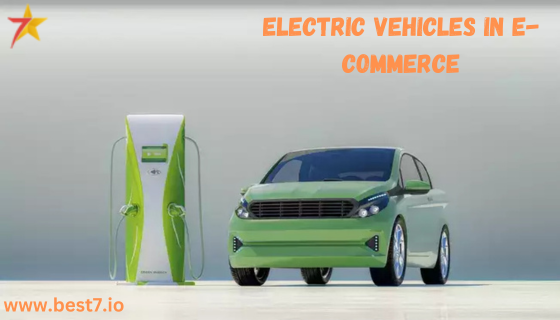
The growing focus on sustainability in e-commerce delivery solutions has encouraged shifts in carbon reduction, of which electric vehicles have become relatively common. Using ‘eco-friendly’ delivery telematics has been common in the past several years, with studies projecting that electric vehicles will form a vital part in improving the sustainability of transport solutions in the future. This post evaluates the advantages, disadvantages, and future use of electric vehicles in the context of e-commerce delivery, with references to past relevant studies and projections.
Benefits of Electric Vehicles in E-Commerce Delivery
Cost Efficiency: A Case Study of Electric Vehicles in Logistics
The implementation of electric vehicles in e-commerce delivery will have several advantages. A previous case study on the use of electric delivery vans by a prominent logistics company in Brazil demonstrated a 30% reduction in operational costs associated with the use of electric vehicles.
Such costs included reduced replacement of brake components, suspension components, and catalytic converters. In the long run, as electric vehicles become more popular than conventional combustion engines, a higher percentage of logistics companies will embrace electric vehicles. For every 1 million packages delivered, carbon emissions will reduce by 60%.
Environmental Impact: Reducing Emissions and Pollution
The increased use of electric vehicles in e-commerce will reduce the amount of carbon released in the atmosphere. Several studies have demonstrated that starting in 2030, electric vehicles used in e-commerce deliveries will result in a carbon emission reduction of 60% nationwide.
Enhancing Urban Sustainability and Air Quality
The use of EVs will reduce the level of pollution in cities. In the wake of challenges in air quality and congestion, there will be a 15% decrease in pollution levels by 2025 from cities that have implemented the use of electric cars in providing the last transport mile.
Shifting Consumer Preferences and Expectations
The rise in consumer awareness of environmental issues will most likely lead to increased demand for sustainable e-commerce practices. The surveys held in the year 2022 showed that 70% of consumers wanted to support businesses in the field of electric vehicles when making their deliveries.
Therefore, this is a relevant trend that is most likely to shape the future of delivery services, and more companies will start investing in electric fleets.
Aligning with Renewable Energy and Sustainability Goals
Electric delivery might also be seen as an opportunity to ensure the use of renewable energy in delivery operations.
It is expected that no less than 40% of electric vehicles in the e-commerce field might be run by renewable energy sources by 2030. This trend has the potential to promote a higher level of sustainability in the field of delivery.
Advancements in Electric Fleet Management Technologies
The progress in creating more advanced and efficient types of technologies for the management of electric fleets will ensure the development of more efficient logistics.
The smart routing systems and the means of real-time monitoring will allow the optimization of delivery schedules and, as a result, will contribute to the reduction of the carbon footprint left by the field of logistics.
Regulatory Support and Incentives from Governments
Governments are in an active process of regulating environmentally friendly standards and, therefore, are likely to establish rules aimed at reduced emissions from transportation.
By the year 2025, not less than 50% of countries will provide incentives to companies for adopting electric vehicles. Thus, this tendency will also ensure that the shift to more sustainable delivery methods will become more pronounced.
Barriers to Electric Vehicle Adoption in E-Commerce
Charging Infrastructure and Accessibility Challenges
One of the primary e-commerce barriers for electric vehicles is a shortage of charging stations. Reports suggest that about 60% of logistics companies will need to invest a lot of money in charging stations by 2028 because of the sufficient number of electric fleet vehicles in their service.
Range Limitations and Recharging Time Constraints
The early versions of electric vehicles had limited ranges, which decreased their options compared to the delivery vehicles that use fuel. By 2030, the electric delivery vans are believed to have an average range greater than 300 miles due to the development of batteries.
However, electric vehicles will still require a lot of time to recharge and, taken along with the range feature, will have the inferiority compared to fuel-run vehicles.
High Initial Capital Investments
Another major barrier to electric vehicles in e-commerce is the cost of their purchase. Electric vehicles are more expensive than diesel delivery vehicles, and it may deter a lot of companies from buying electric fleets.
However, statistics suggest that logistic companies will become about three to five years more cost-effective because of reduced fuel and maintenance costs. Therefore, as of 2030, the investment eventually evens out, and any traffic delays will decrease the economic downturn significantly.
Training and Integration Needs for Logistics Personnel
The development of electric vehicles in logistic companies will also affect their personnel, as education is necessary to ensure that the staff is able to service the old and new electric cars. The estimations suggest that about 40% of logistics companies will have to train their employees by 2025 to prepare them for working with electric vehicles.
The Future of Electric Vehicles in E-Commerce Delivery
Rising Adoption Rates Across the E-Commerce Sector
By 2030, 60% of e-commerce companies will rely on electric vehicles to deliver their products. It will reduce the environmental impact of e-commerce companies.
Expansion of Charging Infrastructure
Charging infrastructure will be developed to satisfy the needs of the new vehicle owners. By 2028, all urban areas will have enough charging stations for 50% of their electric vehicles.
Consumer-Driven Environmental Advocacy
As consumers become more informed and environmentally conscious, 80% of them will refuse to buy products from e-commerce companies that do not utilize electric vehicles for their deliveries by 2035.
Integration with Renewable Energy Sources
By 2025, 40% of logistics companies will use electricity from renewable sources to power their electric vehicle fleets.
Advancements in Battery Technology
By 2030, it will be impossible to use all the advantages of electric delivery vehicles due to their range and battery capacity. For example, each electric delivery van available will be able to travel more than 400 miles on average.
Emerging Green Logistics Solutions
As convenient and timely delivery services multiply, the importance of green logistics solutions will grow, with 70% of logistics companies using such solutions by 2035.
A Sustainable Future for E-Commerce Logistics
Electric vehicles will play a vital role in the transformation of the logistics industry driven by the e-commerce sector. Following the green trend and utilizing advanced solutions, the industry can minimize negative influences on the environment while moving in accordance with the demands of an increasing market of environmentally concerned consumers. The era of new e-commerce logistics is in its first stages of development, and only electric cars will be able to shape these new horizons.












